Related Research Articles
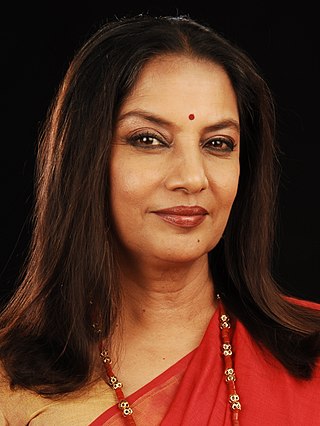
Shabana Azmi is an Indian actress of film, television and theatre. Her career in the Hindi film industry has spanned over 160 films, mostly within independent and neorealist parallel cinema, though her work extended to mainstream films as well as a number of international projects. One of India's most acclaimed actresses, Azmi is known for her portrayals of distinctive, often unconventional female characters across several genres. She has won a record of five National Film Awards for Best Actress, in addition to six Filmfare Awards and several international accolades. The Government of India honoured her with the Padma Shri in 1998 and the Padma Bhushan in 2012.

Shyam Benegal is an Indian film director, screenwriter and documentary filmmaker. Often regarded as the pioneer of parallel cinema, he is widely considered as one of the greatest filmmakers post 1970s. He has received several accolades, including eighteen National Film Awards, a Filmfare Award and a Nandi Award. In 2005, he was honoured with the Dadasaheb Phalke Award, India's highest award in the field of cinema. In 1976, he was honoured by the Government of India with the Padma Shri, the fourth-highest civilian honour of the country, and in 1991, he was awarded Padma Bhushan, the third-highest civilian honour for his contributions in the field of arts.
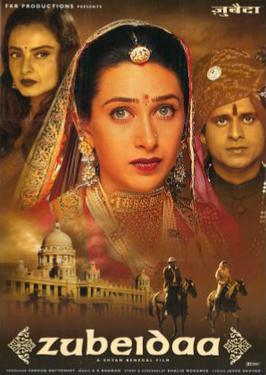
Zubeidaa is a 2001 Indian film directed by Shyam Benegal and written by Khalid Mohammed. It stars Karisma Kapoor, Rekha, Manoj Bajpayee, Surekha Sikri, Rajit Kapoor, Lillete Dubey, Amrish Puri, Farida Jalal, and Shakti Kapoor. A.R. Rahman has scored the background music and soundtrack for the movie.
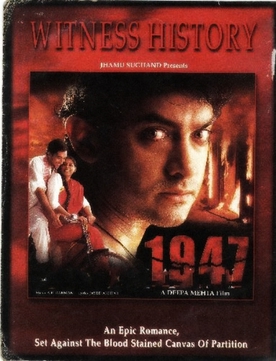
Earth is a 1999 Indo-Canadian period romance drama film directed by Deepa Mehta. It is based upon Bapsi Sidhwa's novel, Cracking India, set during the 1947 partition of India. Earth is the second instalment of Mehta's Elements trilogy, preceded by Fire (1996) and followed by Water (2005). It was India's entry for the 1999 Academy Award for Best Foreign Language Film.

Nandita Das is an Indian actress and director. She has acted in over 40 feature films in ten different languages. Das appeared in the films Fire (1996), Earth (1998), Bawandar (2000), Kannathil Muthamittal (2002), Azhagi (2002),Kamli (2006), and Before The Rains (2007). Her directorial debut Firaaq (2008), premiered at the Toronto Film Festival and travelled to more than 50 festivals, winning more than 20 awards. Her second film as a director was Manto (2018). Based on the life of 20th Century Indo-Pakistani short story writer Sadat Hasan Manto, the film was screened at Cannes Film Festival in the "Un Certain Regard" section. In September 2019, Das produced a two-minute Public Service Announcement music video India's Got Colour. The music video is about the issue of colourism and urges the audience to celebrate India's diversity of skin colour. Her first book, 'Manto & I', chronicles her 6-year long journey of making the film. She wrote, directed, produced and acted in a short film called, Listen to Her, that sheds light on the increase in domestic violence and overburden of work that women have been facing during the lockdown. She had also sought petition seeking the commutation of the death sentence handed out to Ajmal Kasab.
Samar is a 1999 Indian feature film directed by Shyam Benegal. This movie is based on the book "Unheard Voices: Stories of Forgotten Lives" by Harsh Mander. It was produced by National Film Development Corporation of India, a government agency.

Rajit Kapur is an Indian film and theatre actor and director. He is known for his portrayal of Mahatma Gandhi in the 1996 film, The Making of the Mahatma for which he won the National Film Award for Best Actor. Other notable roles are as the protagonist Unni in the Malayalam film Agnisakshi, and the fictional detective Byomkesh Bakshi in the eponymous television series, directed by Basu Chatterjee and broadcast on Doordarshan. His debut film was Suraj Ka Satvan Ghoda (1992), directed by Shyam Benegal.
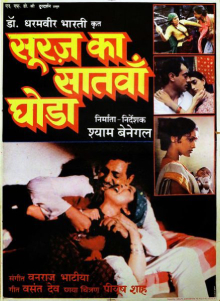
Suraj Ka Satvan Ghoda is a 1992 Indian Hindi film directed by Shyam Benegal and based on the novel The Sun's Seventh Horse by Dharmavir Bharati. It won the 1993 National Film Award for Best Feature Film in Hindi. The self-reflexive film is also known for its subversive take on the "Devdas" syndrome. The film was produced by the National Film Development Corporation of India (NFDC). It stars Rajit Kapur, Rajeshwari Sachdev, Pallavi Joshi, Neena Gupta and Amrish Puri, among others.

Junoon is a 1979 Indian Hindi language film produced by Shashi Kapoor and directed by Shyam Benegal. The film is based on Ruskin Bond's fictional novella, A Flight of Pigeons, set around the Indian Rebellion of 1857. The film's soundtrack was composed by Vanraj Bhatia, and cinematography by Govind Nihalani.
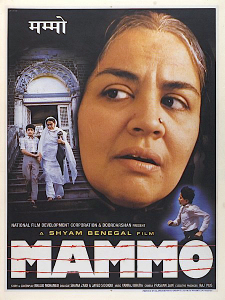
Mammo is a 1994 Indian Hindi-language film by Shyam Benegal. It stars Farida Jalal, Surekha Sikri, Amit Phalke and Rajit Kapur.
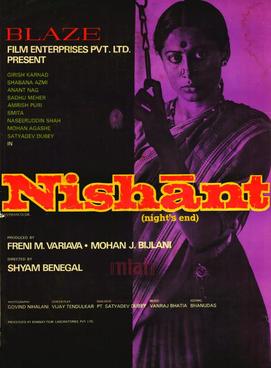
Nishant is a 1975 Hindi drama film directed by Shyam Benegal, based on an original screenplay by noted playwright Vijay Tendulkar, with dialogues by Satyadev Dubey.

Sardari Begum is a 1996 Indian musical film directed by Shyam Benegal. The film stars Kiron Kher, Amrish Puri, Rajit Kapur and Rajeshwari Sachdev.
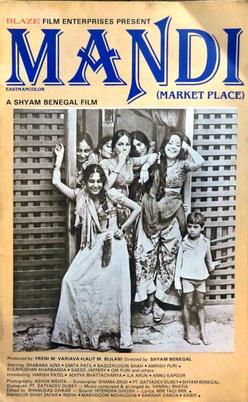
Mandi is a 1983 Hindi-language film directed by Shyam Benegal. Based on a classic Urdu short story Aanandi by writer Ghulam Abbas, the film narrates the story of a brothel, situated in the heart of a city, an area that some politicians want for its prime locality. The film is a satirical comedy on politics and prostitution, and stars Shabana Azmi, Smita Patil and Naseeruddin Shah among others.

Rajeshwari Sachdev is an Indian actress known for her role in Shyam Benegal's film Sardari Begum (1996), for which she won the 1997 National Film Award for Best Supporting Actress.
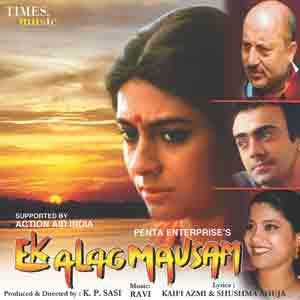
Ek Alag Mausam is a 2003 Hindi movie directed by K. P. Sasi with Nandita Das, Anupam Kher and Rajit Kapur in the lead roles. Renuka Shahane, Arundathi Nag, Sreelatha and Sally Dynevor are in the supporting roles. Veteran Malayalam actor Bharat Gopy appears in a guest role.

Welcome to Sajjanpur is a 2008 Indian Hindi comedy film directed by Shyam Benegal and starring Shreyas Talpade and Amrita Rao.
The Asia Pacific Screen Awards (APSA) is an international cultural initiative overseen by the Asia Pacific Screen Academy and headquartered in Australia, sometimes called "Asia-Pacific Oscars". In order to realise UNESCO's goals of promoting and preserving the different cultures through the influential medium of cinema, it honours and promotes the films, actors, directors, and cultures of the Asia Pacific area to a worldwide audience.
The Sun's Seventh Horse is a 1952 Hindi meta fiction novel by Dharamvir Bharati, one of the pioneers of modern Hindi literature. The novel presents three related narratives about three women: Jamuna, Sati, and Lily. It is narrated by Manik Mulla, who is also a character in the novel, to his friends over seven afternoons, in the style of Hitopadesha or Panchatantra. The novel looks at the disappointments in love faced by these women and how they cope with their lives. The self-reflexive story is also known for its subversive take on the "Devdas" syndrome. The Sun's Seventh Horse was published after Bharati's debut novel Gunahon Ka Devta (1949), which subsequently became a classic.

Samvidhaan: The Making of the Constitution of India is a ten-part television mini-series based on the making of the Constitution of India, directed by Shyam Benegal. The show premiered on 2 March 2014 on Rajya Sabha TV, with an episode scheduled to air every Sunday morning. The series can be viewed on YouTube on Rajya Sabha TV's channel.
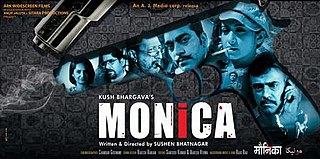
Monica is a 2011 Indian Hindi-language drama film written and directed by Sushen Bhatnagar, starring Divya Dutta, Ashutosh Rana and Rajit Kapur, and produced by Anup Jalota and Kush Bhargava. It is directed by Sushen Bhatnagar and is inspired from real life incidents such as the Shivani Bhatnagar murder case and the 2G spectrum case.
References
- ↑ Adarsh, Taran (26 December 2000). "Hari-Bhari: Fertility Movie Review". Bollywood Hungama . Retrieved 22 October 2024.
- ↑ "47th National Film Awards" (PDF). Directorate of Film Festivals. Archived (PDF) from the original on 16 January 2020. Retrieved 2 September 2020.